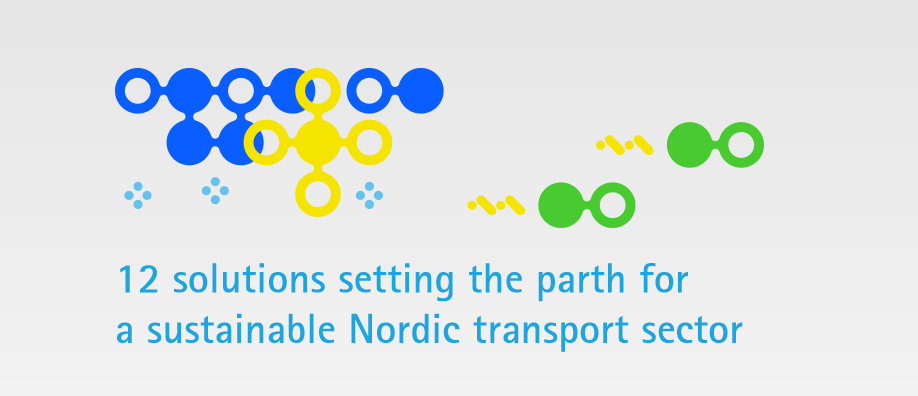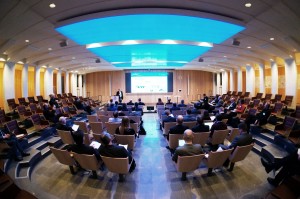
12 solutions setting the path for a sustainable Nordic transport sector
To mark the occasion of the conclusion of the Energy & Transport programme, project managers and participants, fellow researchers and industry representatives met in Stockholm on 6 February 2014. Besides…
 To mark the occasion of the conclusion of the Energy & Transport programme, project managers and participants, fellow researchers and industry representatives met in Stockholm on 6 February 2014. Besides presentations from the programme’s projects, the conference included keynote speakers such as Professor Britta Gammelgaard from Copenhagen Business School, Ann Segerborg-Fick from JTI and Managing Director of FORES, Mattias Goldmann.
To mark the occasion of the conclusion of the Energy & Transport programme, project managers and participants, fellow researchers and industry representatives met in Stockholm on 6 February 2014. Besides presentations from the programme’s projects, the conference included keynote speakers such as Professor Britta Gammelgaard from Copenhagen Business School, Ann Segerborg-Fick from JTI and Managing Director of FORES, Mattias Goldmann.
Moderator of the day was Ole Henrik Hannisdahl from Grønn Bil and he introduced the 12 funded projects, who had all been invited to highlight results from their research. The presentations showed a number of interesting findings. Among these are results from the project called “RekkEVidde”, which had an objective to analyse and find realistic range and performance data of electric vehicles (EVs) in Nordic driving conditions.
The project participants covered all of the Nordic countries, and during their research, lab test of EVs driving range in +23 compared to -20 degrees showed major range differences from 140 km in +23 degrees to only 87 km in -20 degrees, without cabin heating being used. If heating is used, the range was reduced dramatically with up to 20%. Presenter Arto Haakana stated: “It’s not the battery that’s the problem in cold weather, it’s the heater”. This applies to all brands and makes of EVs.”
Another project, managed by the Swedish branch of Move About, looked into driving EVs from Copenhagen to Oslo on a “Nordic Electric Avenue” with car pools and charging stations along the route. Calling it, a “high way” may be a bit of an exaggeration, as Mikael Kilter, CEO, Move About stressed in his presentation the business case on making fast charging and seamless car-swapping possible in the future throughout the route. “For now, charging is the solution when going from Copenhagen to Oslo, not changing cars which would be a faster option. A bit like the horsemen used to do with horses in the old days.“
Supply chains and sustainability
Professor Britta Gammelgaard from Copenhagen Business School gave a talk on “Sustainable goods transport: the supply chain management perspective”.
Up until now, the focus has primarily been on technology, which according to Gammelgaard is good but not enough. To have a complete picture of sustainable freight and transport in general, it is necessary to have a more holistic view of the supply chain. However, she stressed that the supply chain goes outside the Nordic region – it is all part of a bigger picture in a truly global context – making it hard to control.
As Professor Gammelgaard said in her speech, “’Storytelling’ may be part of the future of transport, as buyers of transport e.g. shipping companies are pressed by the end users for providing sustainable transport solutions. However, consumers are not willing to pay for it but see it as a natural part of the product.”
The final speaker of the day was the Managing Director of FORES Mattias Goldmann, who with his outgoing style raised the enthusiasm amongst the audience regarding Nordic cooperation within the energy and transport field. Goldmann talked about the reasons for and against Nordic cooperation and heavily involved the conference participants in his presentation. He also delivered the penultimate quote of the day by summarising his speech and the Nordic cooperation by stating, “It’s not how many heads we are, but how many bright ideas we have”.
Moderator Hannisdahl concluded the conference by stating that: “What came out of the Energy & Transport programme, aside from the concrete project results, is a fantastic Nordic network for the future. Innovation is not about picking the winners today, but about trying and failing, and eventually finding the solution. Therefore, I hope you will all go back home and fail. ”
About Energy and Transport programme
The Energy & Transport programme started in 2009 and a total of 12 projects have received 20 million NOK for research on sustainable energy and transport solutions in the Nordic Region. Adding industry and internal funding, the programme has accumulated resources of a total of 60 million NOK. The programme spans all Nordic countries and has a high degree of industry participation, emphasising the need for collaboration across sectors, industries and boarders to meet the ambitious 2020 goals for the reduction of greenhouse gases.
The Energy & Transport programme was initiated as part of the Globalisation Initiative by the Nordic Prime Ministers and is funded through the Nordic Council of Ministers. From the get-go, the programme had a high vision of creating the “green valley of Europe”.
To learn more on the Energy & Transport programme please visit the website.
